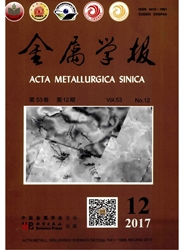

 中文摘要:
中文摘要:
采用XRD和SEM分析了Ti0.7Zr0.3(Cr1-xVx)2=0.1,0.2,O.3,0.4)合金的相组成、晶体结构和元素成分;采用Sieverts装置、差热和热重分析仪(DTA-TG)测量了合金的活化性能、吸放氢P-C—T曲线、热力学参数及高温放氢特征.结果表明,合金为多相组织,存在C36(P63/mmc)和C15(Fd3m)2种Laves相和几种晶格常数近似的钒基bcc固溶体相.当V含量较低时,合金主要由C36型Laves相和少量bcc固溶体相组成.随着V含量增加,C36型转变为C15型Laves相,其中第3种(C层)堆垛存在几率增加,而且合金中bcc固溶体相含量增加.合金在2MPa氢压和常温下能迅速活化;表面氧化后,x=0.1和0.2合金仍表现出优异的活化性能.随着V含量增加,合金的贮氢量增加、平台压力减小.合金氢化的相对偏摩尔焓变(△H)和熵变(△S)的变化范围为-7--28kJ/mol和-35--95J/(mol·K).DTA-TG分析表明,合金氢化物分解主要出现在500~600K温度区间,并呈现对应不同类型氢化物的2个分解温度,加热到800K时合金中稳定的氢化物完全分解.
 英文摘要:
英文摘要:
The crystal structures and phase compositions of Ti0.7Zr0.3(Cr1-xVx)2 (x-=0.1, 0.2, 0.3, 0.4) alloys are analyzed by the XRD and SEM. The hydrogen storage properties, activation performance, thermodynamics and high-temperature desorption process of the alloys are investigated by pressure-composition-temperature (P-C-T) and DTA-TG measurements. The results show that the Ti0.7Zr0.3(Cr1-xVx)2 alloys contain multi-phases, i.e. C36 (P63/mmc) and C15 (Fd3m) Laves phases and V-based bcc solid solution phases with different lattice constants. When the content of V in the alloy is low, the alloy basically consists ofC36 type of Laves phase and small amount of bcc solid solution phase. As the content of V increases, the C36 type transfers into C15 type of Laves phase, where the probability of forming third type of stacking layers (C layers) increases, and the content of the bcc solid solution also increases. The alloys in bulk can be easily activated at 2 MPa and room temperature. The x=0.1, 0.2 alloys present excellent activation performance even after exposure in air for 20 d. As V content increases, the hydrogen absorption capacity of the alloy increases whereas the plateau pressure decreases. The relative partial molar enthalpy (AH) and entropy (AS) of hydrogen absorption for the alloys are found to be in the ranges of-7-28 kJ/mol and -35- -95 J/(mol. K). The DTA-TG analysis indicates that the hydrogen release from the hydrides of the alloys occur in two dissolving temperatures within the range of 500-600 K, and some residual hydrides have completely decomposed at heating temperature up to 800 K.
 同期刊论文项目
同期刊论文项目
 同项目期刊论文
同项目期刊论文
 期刊信息
期刊信息
